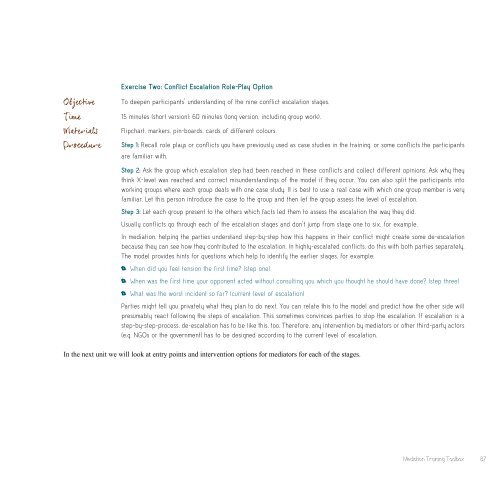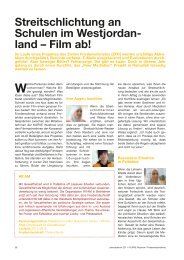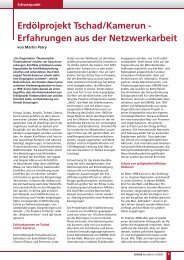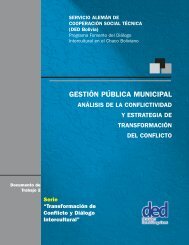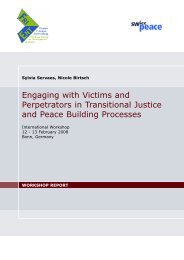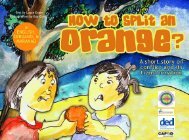Merging Ethiopian Wise-Counsel Mediation and Facilitative ...
Merging Ethiopian Wise-Counsel Mediation and Facilitative ...
Merging Ethiopian Wise-Counsel Mediation and Facilitative ...
- No tags were found...
You also want an ePaper? Increase the reach of your titles
YUMPU automatically turns print PDFs into web optimized ePapers that Google loves.
Exercise Two: Conflict Escalation Role-Play OptionTo deepen participants'’underst<strong>and</strong>ing of the nine conflict escalation stages.15 minutes (short version); 60 minutes (long version, including group work).Flipchart, markers, pin-boards, cards of different colours.Step 1: Recall role plays or conflicts you have previously used as case studies in the training, or some conflicts the participantsare familiar with.Step 2: Ask the group which escalation step had been reached in these conflicts <strong>and</strong> collect different opinions. Ask why theythink X-level was reached <strong>and</strong> correct misunderst<strong>and</strong>ings of the model if they occur. You can also split the participants intoworking groups where each group deals with one case study. It is best to use a real case with which one group member is veryfamiliar. Let this person introduce the case to the group <strong>and</strong> then let the group assess the level of escalation.Step 3: Let each group present to the others which facts led them to assess the escalation the way they did.Usually conflicts go through each of the escalation stages <strong>and</strong> don't jump from stage one to six, for example.In mediation, helping the parties underst<strong>and</strong> step-by-step how this happens in their conflict might create some“de-escalationbecause they can see how they contributed to the escalation. In highly-escalated conflicts, do this with both parties separately.The model provides hints for questions which help to identify the earlier stages, for example:> > When did you feel tension the first time? (step one)> > When was the first time your opponent acted without consulting you which you thought he should have done? (step three)> > What was the worst incident so far? (current level of escalation)Parties might tell you privately what they plan to do next. You can relate this to the model <strong>and</strong> predict how the other side willpresumably react following the steps of escalation. This sometimes convinces parties to stop the escalation. If escalation is astep-by-step-process, de-escalation has to be like this, too. Therefore, any intervention by mediators or other third-party actors(e.g. NGOs or the government) has to be designed according to the current level of escalation.In the next unit we will look at entry points <strong>and</strong> intervention options for mediators for each of the stages.<strong>Mediation</strong> Training Toolbox87


